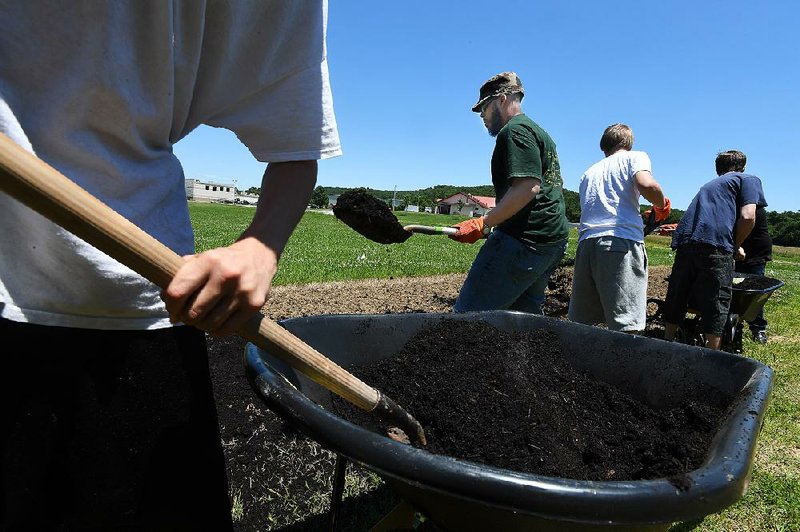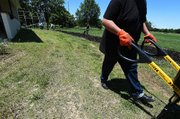FAYETTEVILLE -- Several boys spent a recent sunny afternoon shoveling topsoil into wheelbarrows and moving it to freshly tilled dirt near what will become their garden and greenhouse.
Fast fact
Scientific studies have found gardening may relieve stress and promote a positive mood.
Source: Journal of Health Psychology, 2010
At-risk youth programs
Gardens for at-risk youth isn’t a trend per se, but many groups involved with troubled children are looking for “out of the box” nontraditional programs, such as gardening and outdoor activities. In Craighead County, for example, Families in Need of Services officials have a summertime Nature Program where teens learn about local landscape, identify trees and hike to help them understand their impact on the environment and instill values, responsibility and compassion, said Amy Powell, juvenile officer for Craighead County and treasurer for the Arkansas Juvenile Officers Association.
Source: Staff report
"The goal is for the kids to take food home or to grow food for the community," said Jean E. Mack, director for the Washington County Juvenile Detention Center. "It keeps them off the street."
Officials involved with juvenile detention centers and diversion programs statewide are looking at gardening and other alternative programs to help troubled children. Johnson County has a garden for at-risk youth, and Benton County's probation supervisor Drew Shover plans to try gardening with young people next spring.
Shover said he is considering collaborating with area gardens on their properties "to engage youth more in a community, not just a facility." Washington County owns about 72 acres in Fayetteville near the animal shelter and juvenile detention center that Mack is using for outdoor activities, including a fishing derby.
The county has used grants to build the pavilion, pond, greenhouse and garden on the property. The projects have taken years and have cost thousands in grants and county-donated labor, Mack said. The greenhouse, which is expected to be finished this year, cost about $6,500, she said.
The garden is meant to help children get out of criminal activities, connect with their communities and find a new outlet to relieve stress, officials said. The boys who were moving dirt last week are all between the ages of 15 and 17 and part of a diversion program, Mack said.
Just preparing the garden has made a difference, Mack said. The boys have gone from sullen and suspicious of each other to laughing. Two boys, 15 and 17, said the garden keeps them out of trouble.
Names of the boys could not be released because they are under the age of 18 and are court-ordered to the diversion program.
Mack wants to expand the outdoor activities, she said. The county this year requested a grant to plant fruit trees on the property.
"The sky is the limit," Mack said. "I'm so happy we are utilizing the land out here in such a positive way."
Next spring, the county Veterans Service Office will enlarge the garden, said Josh Medina, county veterans service officer.
Medina helped the boys mix the topsoil into their garden plots. He also gave the boys wheelbarrows left over from a gardening program for elderly veterans that failed years ago, Medina said.
Next year, veterans can use the property for their own gardens and mentor at-risk boys, Medina said. Many of the boys come from similar backgrounds as veterans, Mack said. Two veterans already have volunteered, Medina said.
"It's therapeutic for everybody," he said. "A lot of people love gardening, and there's a reason for that."
Gardening will help the boys see relationships between things, such as how marigolds help keep pests away from tomato plants, Medina said. It's also a way to learn reliance, he said.
"We hope to be cultivating their minds as well," Mack said.
The garden could help the community, Medina said. Some produce will go to a homeless shelter, where about 35 percent of the clients are veterans, he said.
For the boys, the garden represents time outside and a sense of freedom. They said the work is starting to help them relax, but they flinched at the sounds of police sirens nearby. If the boys graduate from the diversion program, two said they would return to help other at-risk teens.
"Me and him," one boy said. "We've been through so much, and we don't want other kids to go through what we've been through."
Metro on 06/12/2017


